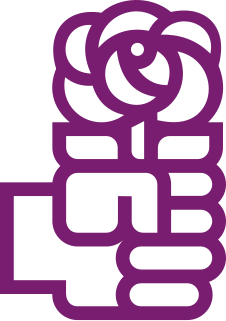Albania is a unitary parliamentary constitutional republic, where the President of Albania is the head of state and the Prime Minister of Albania the head of government in a multi-party system. The executive power is exercised by the Government and the Prime Minister with its Cabinet. Legislative power is vested in the Parliament of Albania. The judiciary is independent of the executive and the legislature. The political system of Albania is laid out in the 1998 constitution. The Parliament adopted the current constitution on 28 November 1998. Due to political instability, the country has had many constitutions during its history. Albania was initially constituted as a monarchy in 1913, briefly a republic in 1925, then it returned to a democratic monarchy in 1928. It later became a socialist republic until the restoration of capitalism and democracy in 1992.

Edi Rama is an Albanian politician, artist, writer and former basketball player, who has been the 42nd Prime Minister of Albania and the Minister of Foreign Affairs since 2013 and January 2019, respectively. Rama has also been Chairman of the Socialist Party of Albania since 2005. Before his election as Prime Minister, Rama held a number of other positions. He was appointed Minister of Culture, Youth and Sports in 1998, a position that he held until 2000.
The Botswana National Front has been the main opposition party in Botswana since the 1969 elections. It achieved its greatest electoral success in the 1994 elections, when it won 37.1% of the vote and 13 of 40 parliamentary seats. A factional conflict in 1998 led to the departure of 11 of these MPs, who then founded the Botswana Congress Party (BCP). In the 1999 elections, the BNF's vote share declined to 26% and it won 6 parliamentary seats. In the 2004 general election the party won 26.1% of the popular vote and 12 out of 57 seats. Its representation was sharply reduced in the 2009 elections, with the party reduced to only six seats in the National Assembly of Botswana. The BNF's parliamentary representation fell to 5 seats following the defection of the party's former Vice President, Olebile Gaborone, to the Botswana Democratic Party (BDP) in July 2010.
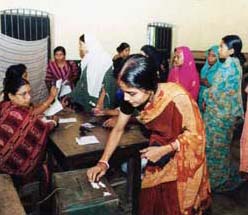
Elections in Bangladesh gives information on election and election results in Bangladesh.

The Portuguese legislative election of 1985 took place on 6 October. In June of the same year, the former Prime-Minister, Mário Soares, had resigned from the job due to the lack of parliamentary support, the government was composed by a coalition of the two major parties, the center-right Social Democratic and the center-left Socialist, in what was called the Central Bloc, however this was an unstable balance of forces and several members of each party opposed such alliance.

Constitutional Assembly elections were held in the newly independent Republic of Montenegro on 10 September 2006. Prime Minister Milo Đukanović's Coalition for a European Montenegro, at whose core was the Democratic Party of Socialists, won 39 seats in the 81 seat parliament with the vote near fully counted. The opposition blocs together received 34 seats. There were 484,430 eligible voters.
Parliamentary elections were held in Montenegro on 22 April 2001. The result was a victory for the Victory is of Montenegro alliance formed by the Democratic Party of Socialists of Montenegro and the Social Democratic Party of Montenegro, which won 36 of the 77 seats.
In 1991, the Socialist Party of Albania, with specific social democratic ideology took control of the country through democratic elections. One year later the Democratic Party of Albania won the new elections. After 1990, Albania has been seeking a closer relationship with the West. What followed were deliberate programs of economic and democratic reform, but Albanian inexperience with capitalism led to the proliferation of pyramid schemes – which were not banned due to the corruption of the government. Chaos in late 1996 to early 1997, as a result of the collapse of these pyramid schemes, alarmed the world and prompted the influx of international peacekeeping forces. In 1995, Albania was accepted into the Council of Europe and requested membership in NATO and is a potential candidate country for accession to the European Union. The workforce of Albania has continued to emigrate to Western countries, especially Greece and Italy.
Parliamentary elections were held in Albania on 24 June 2001. The result was a victory for the ruling Socialist Party of Albania, which won 73 of the 140 seats, resulting in Ilir Meta remaining Prime Minister. Voter turnout was 53.6%.

A parliamentary election was held in Albania on 28 June 2009. No alliance achieved 71 deputies on its own needed to form a parliamentary majority, hence to form the new government the Democratic party and Socialist Movement for Integration joined forces.
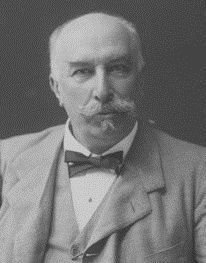
General elections were held in Italy on 26 October 1913, with a second round of voting on 2 November. The Liberals narrowly retained an absolute majority in the Chamber of Deputies, while the Radical Party emerged as the largest opposition bloc. Both groupings did particularly well in Southern Italy, while the Italian Socialist Party gained eight seats and was the largest party in Emilia-Romagna. However, the election marked the beginning of the decline of Liberal establishment.

The 2003 Djiboutian parliamentary election took place in Djibouti on 10 January 2003 to elect the National Assembly of Djibouti. The ruling coalition of President Ismail Omar Guelleh won all 65 seats in the election defeating an opposition coalition.

Legislative elections took place on 10 and 17 June 2012 to select the members of the 14th National Assembly of the French Fifth Republic – a little over a month after the French presidential election run-off held on 6 May.
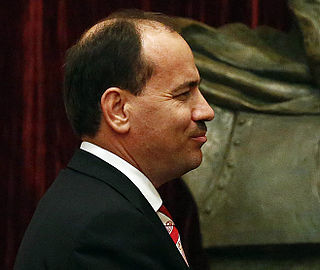
Indirect presidential elections were held in Albania on 30 May, 4, 8 and 11 June 2012. the seventh such elections since the collapse of the communist regime in 1991. The first through third rounds of voting were inconclusive. The fourth round resulted in the incumbent party's member Bujar Nishani being elected as President.
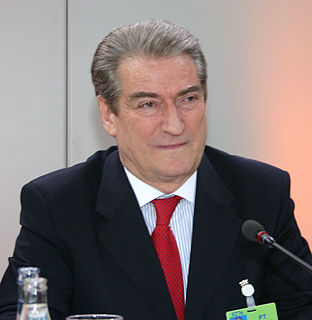
Parliamentary elections were held in Albania on 23 June 2013. The result was a victory for the Alliance for a European Albania led by the Socialist Party and its leader, Edi Rama. Incumbent Prime Minister Sali Berisha of the Democratic Party-led Alliance for Employment, Prosperity and Integration conceded defeat on 26 June, widely viewed as a sign of growing democratic maturity in Albania.
The next Croatian parliamentary elections will be held on or before 23 December 2020. It will be the tenth parliamentary election since the first multi-party elections in 1990 and will elect the 151 members of the Croatian Parliament unless there is a change in the electoral system or number of seats before the date of the election.

The Thirty-first Legislature of Albania, officially known as the IX Pluralist Legislature of Albania, is the legislature of Albania following the 2017 general election of Members of Parliament (MPs) to the Albanian Parliament. The party of the Prime Minister Edi Rama, PS, obtained an absolute majority of 74 deputies, alongside its ally, the Social Democratic Party (PSD), which secured 1 seat and Party for Justice, Integration and Unity (PDIU) 3 seats.





